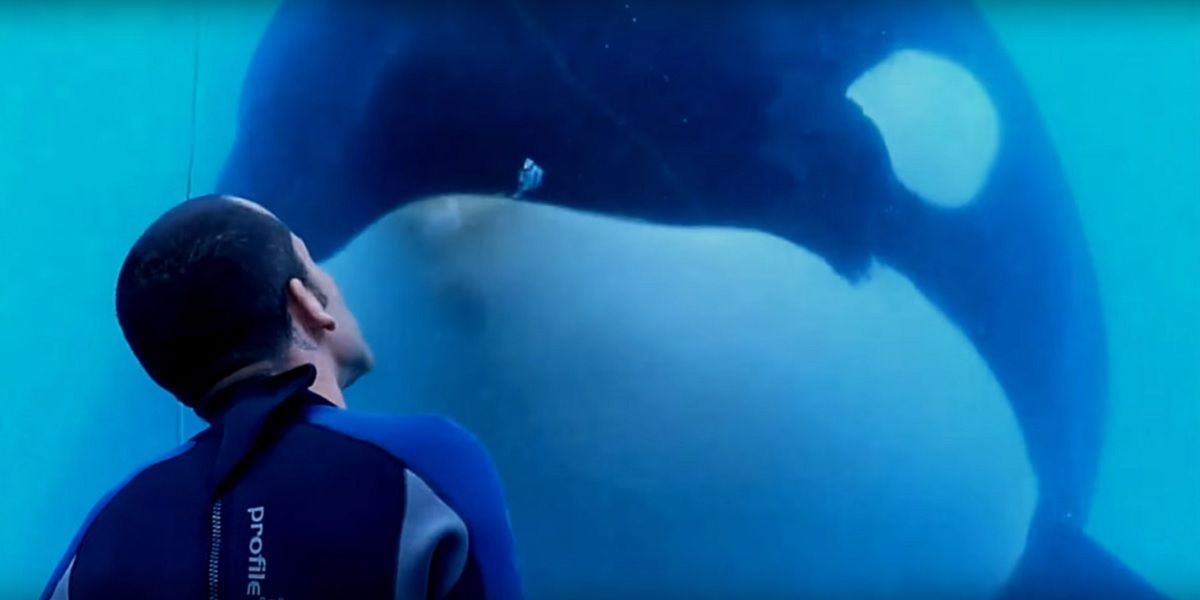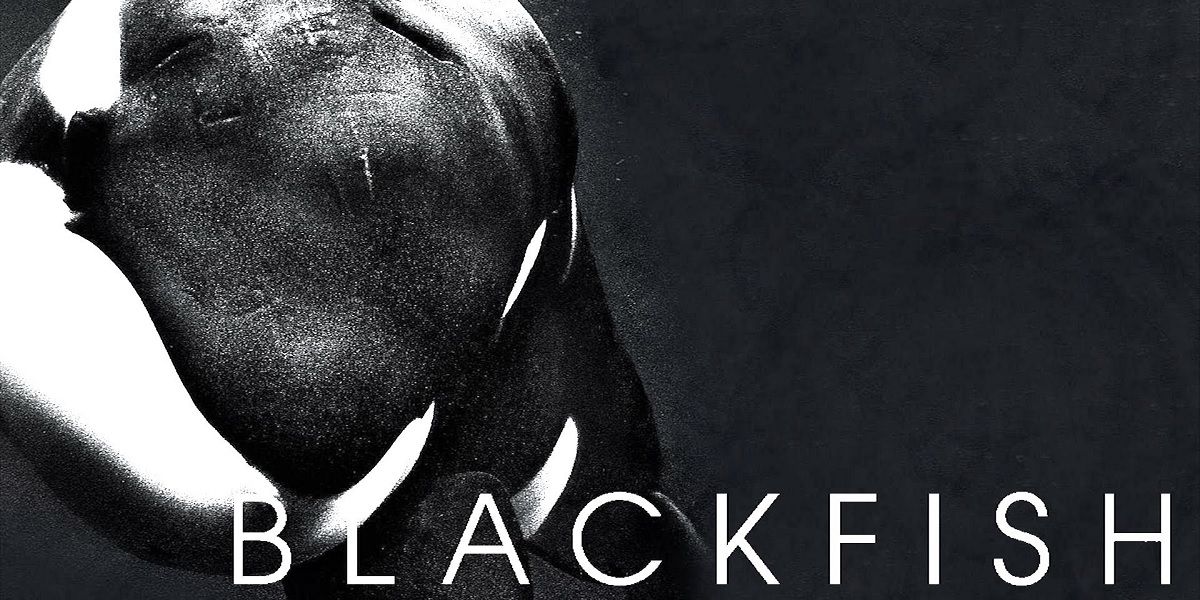As the opening credits for Blackfish display over slowed down underwater footage of trainers in black wetsuits swimming with orcas, the audience hears a slightly scratchy recording of a 911 call. "We need SO to respond for a dead person at SeaWorld," the caller says, matter-of-factly. He continues: "A whale has eaten one of the trainers." The audience can hear his voice breaking on the last few words. Incredulously, the 911 dispatcher repeats, "A whale has eaten one of the trainers?" "That's correct," the caller replies.
It's not until nearly the end of the film that Blackfish tells the full story of the trainer, Dawn Brancheau, but by the end of those opening lines the viewer is already hooked. A chilling documentary about the history and treatment of orcas at SeaWorld - in particular a male orca called Tilikum, who is believed to be responsible for the deaths of three people - Blackfish made huge waves upon its release in 2013. After a two year-long struggle for damage control by SeaWorld's PR department, the theme park announced this week that the traditional Shamu shows with the orcas performing tricks would be phased out in favor of an exhibit that will emphasize their natural behaviors.
Though Blackfish probably can't take all the credit for this latest development, the release of the documentary triggered a massive backlash against SeaWorld that the theme park chain has been struggling against ever since. What's significant is that the outrage wasn't just confined to animal rights activists and groups like PETA. Because Blackfish leaned on the angle of being a psychological thriller about a serial killer (whale), rather than the usual"save the whales" preaching that people have learned to tune out, the film's notoriety spread and SeaWorld was flooded with complaints from people of all backgrounds who had seen the film and been left horrified by it.
Even director Gabriela Cowperthwaite wasn't an animal rights activist when she set out to make the film. In an article on CNN, Cowperthwaite explained that she'd heard about Brancheau's death and had been left with questions about how it could have happened. "I set out to understand this incident, not as an animal activist - because I'm not one - but as a mother who had just taken her kids to SeaWorld," said Cowperthwaite, adding, "And of course as a documentary filmmaker who unfortunately can't let sleeping dogs lie."
SeaWorld's PR response was swift, aggressive, and largely ineffective. The SeaWorld site now has a page titled "Truth About Blackfish," which purports to tackle "false and misleading points" made in the film. The opening 911 call, for example, is cited as "false and misleading" on the basis that the EMT who made the call was mistaken: although Tilikum removed Dawn Brancheau's arm, he didn't actually swallow it. This is not as soothing a balm as SeaWorld probably hoped it would be.
SeaWorld has also released, to date, 54 promotional videos on Youtube specifically aimed at improving the company's image in the wake of Blackfish. There are a couple of reasons why these promos have failed to turn public opinion. The first is that SeaWorld's talent for spin was one of the core subjects of the documentary, so countering it with more chirpy videos of current SeaWorld trainers espousing SeaWorld's virtues - so similar to those archive clips shown in Blackfish - seemed only to reinforce the film's argument.
The second reason is that, regardless of which side is right or wrong, Blackfish is a deeply gripping and disturbing documentary, and SeaWorld's promos are pretty boring. Clip after clip of employees repeating the message that SeaWorld is great and everything is fine just isn't as compelling as footage of an orca bleeding profusely from tooth marks along its side, or seeing countless stomach-churning images of trainers being attacked by whales, or watching the weeping partner of a dead trainer recalling the moment she touched his sheet-covered body and realized that, "Something was wrong. It seemed as though his chest had burst." Blackfish's appeal has as much to do with morbid curiosity as it has to do with animal welfare.
There is a documented tendency of people being able to recall powerful negative images or experiences to a greater degree than positive ones. This is especially true in cinema; conflict is a core element of storytelling that keeps things interesting for the audience. A movie where everything is great and all the characters are happy for 90 minutes probably wouldn't stick in the mind as easily as, for example, Titanic or Schindler's List. In a war between a shocking exposé and a cheery promo, the former has a massive advantage.
Blackfish isn't unique in its role as a documentary that ended up having a significant impact on its subject. Morgan Spurlock's film Super Size Me, in which he ate nothing but McDonald's meals for 30 days, was released in 2004. By the end of that same year, McDonald's had phased out the Super Size option across all of its restaurants. The official word on this decision was that it was "menu simplification" and had "nothing to do with that [film] whatsoever." Obviously McDonald's is still a fast food giant, but following the release of Super Size Me it was common to hear people say that the film had put them off McDonald's food for life.
Perhaps the most notable example of a documentary changing the ending of its own story is Errol Morris' 1988 film The Thin Blue Line, which dug into the case of Randall Dale Adams, a man who spent 12 years imprisoned for a murder that he did not commit. Adams was originally sentenced to death, but within a year of the film's release his conviction had been overturned. This may be the only case of a documentary actually saving someone's life. Adams eventually passed away in October 2010, due to a brain tumor rather than lethal injection.
Movies, even documentaries, are frequently thought of as being detached from real life. They are, after all, chiefly used as a form of entertainment and escapism. Yet all types of media have an impact upon our culture, and this is especially true for documentaries like Blackfish. In the two years since the film first aired on CNN, SeaWorld has suffered declining stock prices, revenue, and attendance. A recent move by the California Coastal Commission banned captive orca breeding at SeaWorld San Diego - a serious blow, since orcas are the parks' main attraction. It's very rare for news reports of these troubling developments for the company to not mention Blackfish as one of the catalysts for change.
Have the SeaWorld orcas actually been 'saved' by Blackfish, though? "I’m cautiously optimistic," Cowperthwaite told the San Diego Tribune, when asked to comment on the new plans for orca exhibits. "My understanding is that SeaWorld may not be stopping the orca show at all. They may simply be repackaging it... I hope I’m wrong." Her concerns are shared by some activist groups, who see the restyled orca shows as simply another part of SeaWorld's ongoing PR campaign.
Cowperthwaite, meanwhile, has moved on to a feature film called Megan Leavey, which stars Kate Mara in the lead role and is based on the true story of a dog handler in the U.S. Marines and her K9 partner, Rex. "I didn't think [Blackfish] would have this kind of impact," she says, looking back on the two years of drama. "All we could do is strike a nerve; the rest has been everybody’s response."
Blackfish is currently available on DVD, Blu-ray, Digital HD and Netflix.


